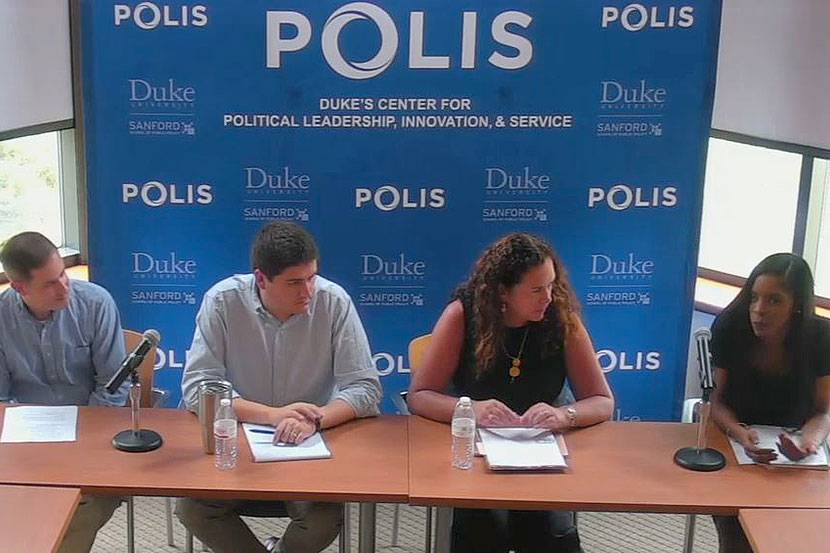Faculty Panel Reviews A Strange Summer of Jarring Political Headlines
POLIS and Office of Civic Engagement hosts event looking back at the top political stories of the summer break

From the 2020 Democratic primary debates to President Trump wanting to buy Greenland, this summer had no shortage of notable moments.
To help make sense how the headlines reflect changes in American politics, three faculty members spoke about the key issues in their areas of expertise – from immigration and generational politics to foreign policy as part of an annual event titled “What Happened?! Unpacking the Summer’s Major News.”
Suzanne Shanahan (Kenan Institute for Ethics director), Deondra Rose (assistant professor of public policy and political science) and Simon Miles (assistant professor of public policy) reviewed the recent news and answered questions following their talks.
Shanahan, who leads several projects working with refugees, spoke extensively about immigration, especially changing trends in the people who are immigrating at the Southern border.
“Now it is increasingly family-driven, so many more women and children crossing, many more unaccompanied minors crossing,” Shanahan said.
She also highlighted the rise of people seeking asylum in the United States “based on a well-founded fear of persecution.” The rhetoric around immigration has changed as well, with more discussion about family separations, the conditions inside immigration detention centers, and people referring to refugees as “invaders.”
Rose spoke about the rhetoric of invasions and the theme of “politics of crisis” in the context of “the Squad,” a group of four young, outspoken Democratic congresswomen: Alexandria Ocasio-Cortez of New York, Ilhan Omar of Minnesota, Ayanna Pressley of Massachusetts and Rashida Tlaib of Michigan. At a rally in Greenville, NC, this summer, Trump mentioned the group and then singled out Omar, leading members of the crowd to chant, “Send her back.”
“He commented on this idea that they’re seeking America’s destruction,” Rose said. “I think there’s this really interesting question of change and some interesting old-guard versus new-guard issues and generational shifts that are going on right now.”
Rose also discussed identity, interest groups, and what it means to be an American in the context of increasing rhetoric about “our” country.
Miles spoke about foreign policy, especially as it relates to North Korea, Iran and Russia. On North Korea, he emphasized the way how propaganda is important to North Korean regime stability.
“North Korea as a totalitarian state needs propaganda to survive, and they got a real doozy in June of 2019 when Donald Trump became the first president of the United States to cross over into North Korea at the Demilitarized Zone…in exchange for absolutely nothing.”
Miles discussed nuclear weapon developments in North Korea; uranium, sanctions, and increased tensions in Iran; and the history and future of recently collapsed nuclear agreements with Russia. He also mentioned President Trump’s proposals to buy Greenland and to use nuclear weapons to deter hurricanes.
The panelists answered student questions about Israel, the detention of immigrants, current immigration policy in the context of historical policies, Russian interference in American democracy, and U.S. Sen. Kamala Harris’s comment on identity politics at an event in Durham.
The panel was moderated by B.J. Rudell (associate director of POLIS: The Center for Political Leadership, Innovation, and Service). The event was sponsored by POLIS and the Duke Office of Civic Engagement.